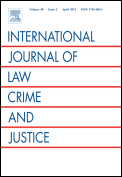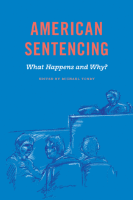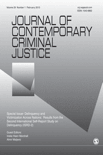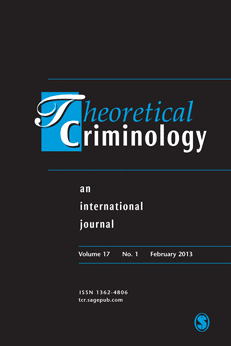
Journal of Experimental Criminology
Scope & Guideline
Transforming Criminology Through Experimental Research
Introduction
Aims and Scopes
- Experimental Research Methodologies:
The journal emphasizes the use of experimental designs, including randomized controlled trials and quasi-experimental studies, to assess the effectiveness of various crime prevention and intervention strategies. - Translational Criminology:
The journal aims to bridge the gap between research and practice by disseminating knowledge that can be applied in real-world settings, particularly in corrections and policing. - Policy Evaluation:
A significant focus is placed on evaluating existing policies and practices in the criminal justice system, assessing their impacts and effectiveness to inform policy reforms. - Interdisciplinary Approaches:
The journal encourages interdisciplinary research that integrates insights from psychology, sociology, law, and public health to better understand crime and justice issues. - Community Engagement and Crime Prevention:
There is a consistent emphasis on community-based approaches to crime prevention, exploring the role of social cohesion, community resources, and public perceptions in shaping crime outcomes.
Trending and Emerging
- Mental Health and Policing:
There is an increasing focus on mental health co-response strategies within policing, reflecting a recognition of the complexities involved in addressing crime involving individuals with mental health issues. - Impact of Technology on Crime Prevention:
Research exploring the effectiveness of technological interventions, such as body-worn cameras, gunshot detection systems, and mobile safety applications, is gaining traction, highlighting the role of technology in modern policing. - Community and Procedural Justice:
Emerging studies emphasize the importance of procedural justice and community perceptions of policing, reflecting a shift towards understanding how police practices affect public trust and cooperation. - COVID-19 Related Crime Trends:
Research examining the impact of the COVID-19 pandemic on crime patterns and law enforcement practices is increasingly relevant, reflecting the need to understand the pandemic's long-term effects on crime and justice. - Youth and Delinquency Interventions:
There is a growing interest in experimental evaluations of interventions aimed at preventing youth delinquency, highlighting the importance of early intervention and community-based programs.
Declining or Waning
- Theoretical Criminology:
There appears to be a reduced emphasis on purely theoretical discussions and frameworks, as the journal increasingly prioritizes empirical studies that yield actionable insights and applications. - Descriptive Studies:
The frequency of descriptive studies that do not employ experimental methods has declined, as the journal has shifted towards research that can rigorously test hypotheses and establish causal relationships. - Traditional Policing Methods:
Research focused on traditional policing strategies without innovative or experimental evaluations is becoming less common, as the journal seeks to highlight more progressive and evidence-based approaches to policing.
Similar Journals

International Journal of Law Crime and Justice
Exploring the Nexus of Law, Crime, and JusticeThe International Journal of Law Crime and Justice, published by ELSEVIER SCI LTD, serves as a pivotal platform for the dissemination of cutting-edge research in the fields of law, crime, and justice. Established in 2008, the journal has established itself as a reputable source in its domain, holding a respectable Q2 ranking in Law, Political Science and International Relations, as well as Sociology and Political Science as of 2023. With an impact factor reflecting its influence, this journal ranks favorably within the top percentiles of Scopus in several social science categories, making it a critical resource for scholars and practitioners. The journal promotes open access, ensuring that vital research is accessible to a global audience. Scholars interested in the intricate intersection between legal studies, societal challenges, and crime will find the journal's objectives aligned with fostering knowledge and innovation in this dynamic field. Operating from its headquarters in London, England, the journal continues to invite substantial contributions that address contemporary issues and enhance our understanding of law and justice worldwide.

PSYCHOLOGY CRIME & LAW
Exploring the Nexus of Mind, Crime, and JusticePSYCHOLOGY CRIME & LAW, published by Routledge Journals, Taylor & Francis Ltd, is a premier academic journal dedicated to the intersection of psychology, criminology, and the law. With an ISSN of 1068-316X and an E-ISSN of 1477-2744, this journal provides a critical platform for the dissemination of cutting-edge research and innovative methodologies in the fields of psychology, forensic medicine, and legal studies. Spanning over three decades (1994 to 2024), it holds impressive Scopus rankings, placing it in Q1 and Q2 quartiles for its contributions to law and forensic medicine, highlighting its standing within the academic community. PSYCHOLOGY CRIME & LAW is particularly noted for addressing contemporary issues at the crossroads of human behavior and legal standards, making it essential reading for scholars, practitioners, and students alike. While the journal is not open access, it offers valuable insights into a variety of topics, from criminal psychology to the implications of mental health in legal contexts, ensuring that it remains an influential resource for those engaged in research and professional practice.

Journal of Penal Law and Criminology-Ceza Hukuku ve Kriminoloji Dergisi
Shaping the Future of Criminological ResearchThe Journal of Penal Law and Criminology-Ceza Hukuku ve Kriminoloji Dergisi, published by ISTANBUL UNIV, is a prestigious platform dedicated to the advancement of knowledge in the fields of criminal law and criminology. With its Open Access policy adopted since 2017, it aims to promote the dissemination of research findings and theoretical discussions, ensuring that vital insights in criminal justice, legal reforms, and criminological studies are accessible to a global audience. This journal serves as a vital resource for academics, legal practitioners, and students alike, fostering interdisciplinary dialogue and encouraging innovative research. By focusing on contemporary issues in penal law and criminology, the journal enhances understanding and addresses the complexities of justice in a rapidly changing society. With an ISSN of 2148-6646 and an E-ISSN of 2602-3911, it continuously strives to maintain high scholarly standards and relevance in its contributions to the field.

JOURNAL OF QUANTITATIVE CRIMINOLOGY
Exploring the Intersection of Law and ForensicsJOURNAL OF QUANTITATIVE CRIMINOLOGY, published by Springer/Plenum Publishers, serves as a premier outlet for cutting-edge research in the fields of law and forensic medicine. With an impressive impact factor and ranked in the top quartile (Q1) of both Law and Pathology and Forensic Medicine categories in 2023, this journal excels in providing empirical analyses and quantitative assessments that address critical issues in criminological research. Since its inception in 1985, the journal has maintained a reputation for excellence, evidenced by its high standing in Scopus rankings—21st out of 1025 in Social Sciences (Law) and 23rd out of 208 in Medicine (Pathology and Forensic Medicine). Although currently not an open access publication, it offers several subscription-based access options to reach a wide array of academics and professionals dedicated to the advancement of criminological and forensic inquiries. Researchers, professionals, and students will find the JOURNAL OF QUANTITATIVE CRIMINOLOGY an invaluable resource, as it fosters interdisciplinary collaboration and methodological rigor in understanding crime and criminal behavior.

Crime and Justice-A Review of Research
Transforming knowledge into action in crime studies.Crime and Justice: A Review of Research is a leading scholarly journal published by the University of Chicago Press, dedicated to advancing knowledge in the fields of sociology and political science, specifically through the lens of crime and justice studies. With an ISSN of 0192-3234 and an E-ISSN of 2153-0416, this academic journal offers a distinguished platform for researchers, practitioners, and students to explore contemporary issues, methodologies, and theoretical advancements within the domain. Ranked in the Q2 category for both sociology and political science as of 2023, it has gained recognition with an impressive Scopus rank of #150 out of 1466 in its field, placing it in the 89th percentile. The journal publishes comprehensive reviews and research articles that inform best practices and policies in crime prevention, law enforcement, and social justice, fostering a deeper understanding of the complexities surrounding crime and societal responses. Though it is not an open-access journal, the insightful research it presents is indispensable for academic discourse and practical application in addressing the multifaceted challenges of crime and justice in contemporary society.

Journal of Contemporary Criminal Justice
Advancing the Discourse on Justice in Modern Society.Journal of Contemporary Criminal Justice is a leading academic publication within the field of criminal justice, published by SAGE Publications Inc. This esteemed journal, bearing the ISSN 1043-9862 and E-ISSN 1552-5406, has been contributing significantly to the discourse on contemporary issues in justice systems since its inception in 1978. Renowned for its rigorous peer-reviewed articles, the journal holds an impressive 2023 ranking within the Q1 quartile in Law, further affirmed by its Scopus rank of #110 out of 1025 in the field of Social Sciences - Law, placing it in the 89th percentile. Though not an open access journal, it provides a vital platform for scholars, practitioners, and students seeking to explore and disseminate pioneering research and practical insights into the evolving criminal justice landscape. The journal covers a wide array of topics, from policy analysis to sociological perspectives, ensuring its relevance across multiple disciplines. With a commitment to advancing the understanding of justice in contemporary society, the Journal of Contemporary Criminal Justice is an essential resource for anyone engaged in the fields of criminology, criminal law, and social policy.

JOURNAL OF CRIMINAL LAW & CRIMINOLOGY
Deepening Insights into Legal and Criminological TheoriesJournal of Criminal Law & Criminology, published by Northwestern University, is a premier scholarly journal dedicated to advancing the understanding of criminal law and criminological theories. Established in 1974, it has a strong history of publishing rigorous empirical research and critical analyses, contributing significantly to the discourse in legal and criminal justice studies. With an impressive impact factor and recognized as a Q1 journal in Law, it ranks favorably within the Scopus database, positioned in the top 25% of its category. This journal is essential for academics, legal practitioners, and students seeking insightful perspectives and developments in contemporary criminal justice issues. Although not open access, it provides a wealth of resources and discussions, making it an invaluable asset for anyone engaged in the study of law and criminology.

THEORETICAL CRIMINOLOGY
Pioneering Scholarly Discourse in CriminologyTHEORETICAL CRIMINOLOGY is a premier academic journal published by SAGE PUBLICATIONS LTD that serves as a vital platform for the dissemination of cutting-edge research in the realms of law, sociology, and forensic medicine. Established in 1997 and converging into a comprehensive resource through 2024, this journal has achieved a remarkable reputation with a 2023 Q1 ranking in Law as well as in Sociology and Political Science, underscoring its influential contributions to these disciplines. Situated in the United Kingdom, it is recognized for its rigorous peer-reviewed content and holds prestigious positions in Scopus rankings, including Rank #34 in Social Sciences - Law and Rank #38 in Medicine - Pathology and Forensic Medicine, reflecting its commitment to academic excellence. Although it does not currently offer open access options, the journal ensures that its articles are accessible through institutional subscriptions, making it an indispensable resource for researchers, professionals, and students aiming to deepen their understanding of theoretical frameworks and contemporary issues in criminology.

Annual Review of Criminology
Fostering a Deeper Understanding of Crime Dynamics.The Annual Review of Criminology is a premier academic journal dedicated to advancing the field of criminology through comprehensive reviews of the latest research and emerging trends. Published by Annual Reviews, this journal is highly regarded within the legal realm, boasting a prestigious Q1 ranking in the Law category and an impressive Scopus rank of #13 out of 1025, indicating its significant influence with a 98th percentile standing. The journal focuses on synthesizing key developments from various branches of criminology, making it an essential resource for researchers, professionals, and students alike. Although it does not offer open access, readers can engage with high-quality, peer-reviewed articles that not only address contemporary issues but also provide foundational knowledge for future inquiries. With volumes converging from 2018 to 2021 and 2023 to 2024, the Annual Review of Criminology underscores its commitment to scholarly excellence and the dissemination of critical insights in the evolving landscape of criminal justice.

Revista Criminalidad
Disseminating Critical Research for a Safer SocietyRevista Criminalidad, published by POLICIA NAC COLOMBIA, is a distinguished academic journal that has been open access since 1958, making critical research in the field of criminology readily available to the global scholarly community. Based in Colombia, this journal serves as a prominent platform for the dissemination of high-quality research on crime, law, and social sciences. Notably categorized in various quartiles for 2023, including Q2 in Arts and Humanities (miscellaneous) and Q3 in Law, it holds respectable rankings in the Scopus database, reflecting its significance and contribution to both academic and practical discourse. The journal invites researchers, professionals, and students to explore its comprehensive scope, spanning vital themes relevant to criminology and public safety, making it an essential resource for those invested in the interplay between society, law, and criminal behavior. For up-to-date research and insights, the journal is accessible at the CENTRO INVESTIGACIONES CRIMINOLOGICAS DIJIN, AVE EL DORADO 75-25, BOGOTA.